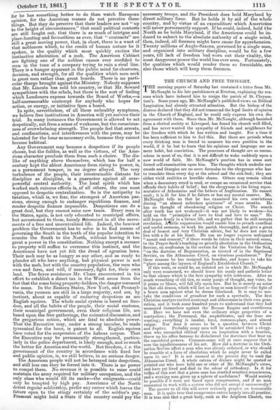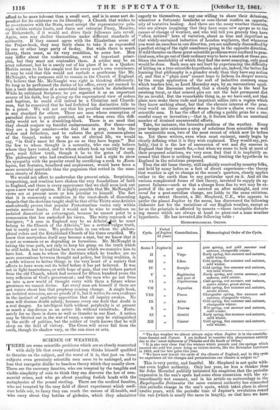THE CHURCH AND FREE THOUGHT.
THE morning papers of Saturday last contained a letter from Mr.
MeNaught to his late parishioners at Everton, explaining the rea- sons which have induced him to resign the parish of St. Chrysos- tom's. Some years ago, Mr. McNaught's published views on Biblical Inspiration had already attracted attention. But the bishop of the diocese declared that they did not transcend the legal limits of opinion in the Church of England, and he could only express his own dis- agreement with them. Since then Mr. MeNaught, although banished from a clerical society at Liverpool, has found his church well filled, and has never wanted the sympathy of friends and neighbours for the freedom with which he has written and taught. For a time it has been sufficient to him to feel this. But there are periods when every thinking man is forced to measure his own position in the world, if it be but to learn that his opinions and language are no mere habit, but conviction. The processes of thought are so uncon- scious in most of us, that it is not difficult to wake suddenly upon a new world of faith. Mr. MeNaught's position has in some sort forced self-examination upon him. The thoughts which underlie our creeds and liturgies are no mere formulas to the clergyman who has to translate them every day at the school and the sick-bed ; they are either vivid realities or horrible shams. Others may remain silent when a damnatory creed is read, or escape an occasional service that offends their habits of belief; but the clergyman is the living repre- sentative of Athanasius and the fathers of Anglicanism. He cannot omit; it is ill for him if he falters or has any mental reserve. Mr. MeNaught tells us that he has examined his own convictions during "an almost unbroken quietness" of some months. He has no thought of abandoning religion or Christ. The search after truth has not weakened—it was not likely to weaken—his hold on the "principles of love to God and love to man." He still hopes firmly in a future life, and we gather that he still accepts revelation. klittle suppression would enable him to preach excellent and useful sermons, to work his parish thoroughly, and give a great deal of honest and very Christian advice, but he does not care to live with a lie at his heart. He can no longer express unfeigned "assent and consent," if these words be taken in their natural sense, to the Prayer-book's teaching on priestly absolution in the Ordination Service, on confession in the service for the Visitation for the Sick, "on the doctrine of Regeneration, as treated of in the Baptismal Service, on the Athanastan Creed, on vicarious punishment." For these reasons he has resigned his benefice, and hopes to take his "place among the laymen of England's Established Church." If this were, or could be, an isolated act in which Mr. MeNaught only were concerned, we should leave his manly and pathetic letter to that silence which is the best sympathy with nobleness. After so much wrenching of old ties, so many pangs of thought, any voice, be it praise or blame, will fall idly upon him. But he is merely an actor in that old drama, which will last as long as man himself—the fight of a brave man against what he deems falsehood. It is easy to mis- take the conditions of grandeur for such a spectacle. The first Christian martyrs excited contempt and abhorrence in their own gene- ration, and it took some hundred years to understand that they had measured themselves against the Roman Empire and overthrown it. Here we have not even the ordinary stage properties of a martyrdom ; the Proconsul, the amphitheatre, and the lions are wanting; everything is insular, local, common-place, and almost vulgar. Nor does it seems to be a question between Christ and Jupiter. Probably many men will be astonished that a clergy- man who reconciled critical views on inspiration with a benefice, threw up his office because he disbelieved the doctrines that bear on the sacerdotal powers. Common-sense will at once suppose that it sees the injudiciousness of his act. How did a doctrine in the Ordi- nation Service affect a man who was already ordained, or why should he stumble at a form of absolution which he might never be called upon to use? It is not unusual at the present day to omit the Athanasian Creed. A whole catena of divines might be quoted or pointed out who have held one or other of Mr. MeNaught's views, and have yet lived and died in the odour of orthodoxy. Is it for trifles of this sort that a pions man has startled sensitive consciences, and a working man given up a sphere of usefulness? Would society be possible if it were not based upon compromises, and if no man consented to work with a system who did not accept it unreservedly?
The answer to all this will never seriously perplex: an honourable man. It is quite true that compromise enters largely into all practice. It is true also that a great body, such as the Anglican Church, can
afford to be more tolerant than a small sect, and is in some sort de- pendent for its existence on its liberality. A Church that wishes to be co-extensive with the State, must accept the representative prin- ciple within certain limits and dares not ostracize Pusejr, Maurice, or Bickersteth, if it would not drive their followers into revolt. Again, men may shelter themselves under different standards of authority. If they cannot agree with the Elizabethan sense of the Prayer-book, they may fairly claim to take it as expounded by one or other large party of to-day. But while there is much liberty, there must, as its very condition, be some law. Men may differ about the understanding, even of important princi- ples, but they must not contradict them. A soldier may be an army reformer, but he is surely out of his place if he is a Quaker. Herein seems to lie the simple test for every man's own conscience. It may be said that this would not exclude a gentleman like Mr. McNaught, who purposes still to remain in the Church of England. We beheve that Mr. McNaught was right in thinking differently. So long as he performed the duties of his office, every act seemed to him a tacit declaration of a sacerdotal theory, which he disbelieved. While he criticised Scripture he yet regarded it as an important source of his faith, but in giving up the supernatural view of orders and baptism, he could still indeed be a Christian and Church- man, but he conceived that he had forfeited his distinctive title to be a priest. We will not say that his peculiar conscientiousness Is any standard for others. There are men whose conception of parochial duties is purely practical, and to whom even this diffi- culty would not be a stumbling-block. There is no need that they should conjure up fanciful embarrassments. For those—and they are a large muuber—who feel that to pray, to help the widow and fatherless, and to enforce the great common-places of the Gospel, makes up the aura of clerical life, we would say, "in God's name let them go on as they have begun." But the few to whom thought is a necessity, who can only believe where they have tested, and to whom others look up tacitly for an
• must follow truth, though it be to the gates of death. The philosopher who had swallowed hemlock had a right to show his sympathy with the popular creed by sacrificing a cock to /Esen- lapius, but Socrates, beneficed and acquiescent, would have been a more mournful spectacle than the paganism that rotted in the com- mon streets of Athens.
We would not affect to undervalue the present crisis. Scepticism, temporising, and reaction have shaken the very foundations of faith in England, and there is every appearance that we shall soon look out upon a new war of opinion. It is highly possible that Mr. MeNaught's views are at present more or less peculiar to himself. The fact that it is commonly. a condition in the trust-deeds of dissenting chapels that the doctrine taught shall be that of the Thirty-nine Articles undoubtedly proves that popular Protestantism varies only within certain narrow limits. But it would not be wise to condemn an isolated dissentient as extravagant, because he cannot point to a communion that has embodied his views. The witty reproach of a foreigner, "A man in England may be an Atheist,abut he must belong to the Church of the Atheists," has a certaiulgar truth, but is surely not true. We profess faith in one whom the philoso- phical rulers and the Established Church of his times crucified. We know that martyrdom itself may become a cant, but we 'know that it is not as common or as degrading as formalism. Mr. McNaught is taking the true path, not only to keep his grasp on the truth which he still holds, but to lead him back to some which we conceive him to have lost. A man to whom the doctrines which he teaches are no mere conventions between thought and policy, but living realities, is a noble witness to better things in the very heart of a society that affects to have worn out its belief before it has yet believed. It was not in light-heartedness, or with hope of gain, that our fathers parted from the old Church, which had seemed for fifteen hundred years the very. reflexion of God's government; and the men who go out from us into a, new world of thought carry with them a future whose greatness we cannot divine. Let every man ask himself if there are not voices about him that prophesy coming change. A single book, an isolated secession, arc no proofs of it, but it writes its own evidence in the instinct of apathetic opposition that all inquiry awakes. No man will discuss doubt calmly, because every one feels that doubt is a real danger. An intelligent faith without perplexity is at present as much a day-dream as an active life without vicissitude. Fortu- nately for us there is dawn as well as thunder in our East. A nation may be blotted out in the war of races, a cause may be extinguished in the strife of politics, but the soldier of truth knows that he will sleep on the field of victory. The Cross will never fail from the earth, though its shadow vary, as the sun rises or sets.































 Previous page
Previous page